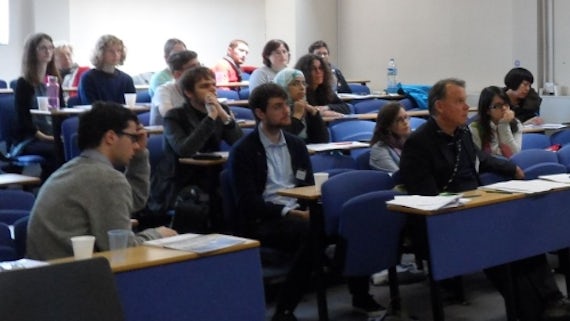Across Borders: Translation and Migration
22 Mai 2013

The past week-end saw the beginning of a new tradition for the School: the first Cardiff Annual Post-graduate Conference in Translation and Language Studies 17th May.
As a testimony to the growing number of post-graduates in the School we felt it was time to create a platform for our students to meet and interact with other post-graduates and established scholars in a stimulating and supportive environment.
‘Translation’ and ‘migration’ are critical concepts that underpin many of our students’ doctoral projects but also constitute important research (Politics of translation research group & Representing Mobility and Migration) strands within the School.
A keynote paper by Edwin Gentzler (UMASS) on Thursday 16th set the tone for the next day combining a critical snapshot of current immigration policies in the US with sharp theoretical insights on the challenges of researching translation and migration. The paper established a very productive dialogue with Loredana Polezzi’s talk ‘On Maps and Bodies’ we heard back in February. Immigrants migrants and refugees are always in the process of ‘translating’ both as a means to conform and as a way to resist assimilation. But how do we go about mapping this interdisciplinary terrain? Polezzi suggested Foucault’s alternative political positions and Bakhtin’s liberating concept of heteroglossia as guiding principles. Revisiting Derrida’s reflections on ‘monolingualim’ and ‘otherness’ Gentzler’s suggestion is to sift through historical records to uncover the ‘language struggles’ that have underpinned the construction of national identities.
Gentzler also encouraged all of us to go out there and begin to trace ‘all the translation activity going on behind closed doors’: in migrant households and community centres but also in public culture and institutional contexts looking at models of citizenship and language policies. However one must never loose sight of the methodological challenges that these hidden translations pose. ‘Oral not written broken not standard’ these testimonies are often silenced or worse erased by public records.
Our second keynote was by Susan Bassnett (Warwick University) one of the founders of Translation Studies (1980) who three decades on remains one of its most interesting voices. Her discussion of rich and fascinating examples of ‘the freeing power of translation’ from a wide range of time periods places and languages reminded us that ‘the act of translation is primarily an act of reading’ never absolute and never complete. Within the very act of translation lies a Derridean remainder and after translation as After Babel ‘there is always something that is left behind’.
The broad range of papers that followed ensured an exciting day – we heard about a diverse range of subjects from a reading of Walter Benjamin’s ‘redemptive’ translation as an antidote to the language of judgment in post-colonial contexts (Edmund Chapman University of Manchester) to hybridity and cultural métissage in contemporary Catalan and French fiction (Merixtell Joan Rodriguez Goldsmith College). Cardiff students held their own showcasing the breadth of the translation research going on within and outside the school including a portrait of the extraordinary experience of Kate Bosse Griffiths a Jewish-German exile and Welsh poet (Gwennan Elin Higham School of Welsh) and a fascinating exploration of the role of migrant children as interpreters in Welsh schools (Malgorzata Rutecka EUROP).
‘Is it not important for the survival of feeling today for a man [woman] to know another living language?’ asked George Steiner over fifty years ago in Language and Silence. Such a championing of the intellectual value of modern languages and translation in the humanities has never been so timely as in today’s global academia. Events such as last week’s post-graduate conference provide much needed spaces for new and original research in these areas to grow and thrive.